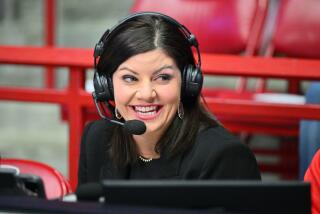For Generation of Met Fans McCarver Told it Like it Was
- Share via
The Mets said it was all about Tom, and not about Tim. Effecting the return of Tom Seaver clearly was their primary motivation. But they concluded the return of the most accomplished player in their history necessitated the exile of the best analyst in the business. So there sides to this: the upside, Tom; the downside, Tim.
Seaver is addition by addition, McCarver subtraction by subtraction. And now there’s less of a chance the Mets’ over-the-air telecasts will be greater than the sum of their parts. As advertised, Seaver will bring to 50 Mets telecasts elements and flavor no one else can. McCarver had done that for hundred of games over 16 seasons. And he made Ralph Kiner better.
The Mets decided it couldn’t be Tim and Tom Terrific together. A too-much-talk tandem, they thought. Not enough words to share. They rejected the possibility of a Dream Team. A pitcher and a catcher. And Kiner, a hitter. And Gary Thorne, a lawyer. All that would have been lacking to cover today’s game was an accountant.
So McCarver’s gone and with him more years of Mets history than Seaver experienced in uniform. The Mets wanted to “reconnect with our history.” But after they did, they disconnected with McCarver, who had narrated 16 years of it.
Will Seaver recall Ray Knight’s home run against the Pirates in April, 1986, know how well Kevin McReynolds covered left field or how Jeff Innis mimicked Frank Cashen? How much can Seaver know about losing 27 straight games or Anthony Young? Does he know how well HoJo hit the knuckleball or that Doc Gooden once slipped look-alike plastic fishing lures into Mel Stottlemyre’s stash of Gummi worms?
McCarver’s departure is a mistake, yet another one the Mets have made involving Seaver. They traded him away for the wrong reasons in 1977. They allowed him to be snatched away from them 6 1/2 years later after one year of remarriage. Not including problems that players brought upon themselves, Seaver’s two departures stand among the most damaging developments in the club’s history. The departure of McCarver ranks right there with them.
A year after Al Harazin hired McCarver, I suggested to him the move was among the best decisions the club ever had made. He didn’t disagree. “He sells your team,” Harazin said. “He’s the most critical connection we have to the public.”
Harazin spoke of the need to have a sophisticated, unbiased coverage in the New York market. And whimsy, too. McCarver provided all three.
There were no passed balls with McCarver. He saw the entire field from a catcher’s perspective. Seaver is bright and insightful and knows pitching and the game. But pitchers tend to have tunnel vision, an occupational necessity when they’re pitching, a hazard when they’re viewing the game from a point other than the rubber.
This market once had three baseball teams and more than twice as many newspapers. It demanded more objectivity than most markets. There was no place for rooting or sugar-coating. McCarver knows that.
So does Seaver. He knows a line must separate the announcer from the team in this market. He spoke Wednesday of Bob Prince, the late play-by-play man for the Pirates. Prince drew the line closer to his heart than the New York market ever would have tolerated, much less embraced. Announcers in some other cities refer to the team as “us” and “we” and it sounds like fingernails on the blackboard.
Seaver will draw the line differently, farther from his heart. He knows what’s right and what’s expected. Now though, because his appointment and McCarver’s exile were executed simultaneously and because of McCarver’s conspicuous independence, he will be viewed differently, scrutinized more. He will be compared with McCarver.
Seaver would have benefited more from working with McCarver rather than after him. And the rest of us would have benefited if Seaver had been brought in to regale, recall, rebut and recap with McCarver rather than replace him.
More to Read
Go beyond the scoreboard
Get the latest on L.A.'s teams in the daily Sports Report newsletter.
You may occasionally receive promotional content from the Los Angeles Times.










